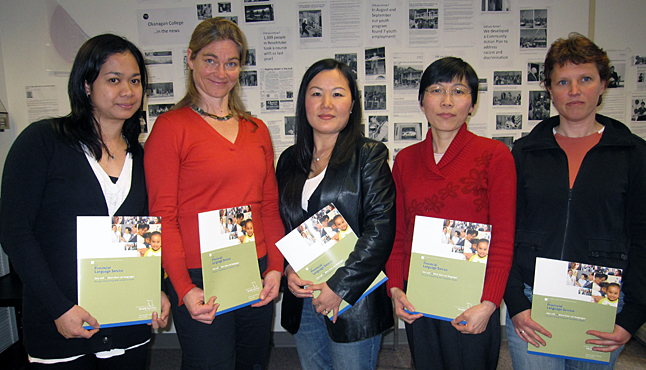
By David F. Rooney
There are moments in the life of every community when linguistic and cultural barriers can impede attempts to deal with tragedy. At times like those having a trained interpreter can make critical difference.
Wendy Jin remembers the November 2000 collision in the Lanark Snow Shed when a transport truck collided with a bus full of Taiwanese tourists, killing six people. The tragedy was compounded by the fact that none of the rescuers could speak Chinese.
No one died as a result of the communications problem, but it was an eyeopener for Jin. After that she wanted to find a way she could make a meaningful contribution to the community. She found that through the Building Better Communities through Access and Action Program offered through Okanagan College, which is a major local participant in the province’s Welcoming and Inclusive Communities and Workplaces Program (WICWP).
For fellow new interpreter Kathrina De Vera, receiving her certificate means she can help fellow Filipino immigrants deal with the settlement issues that frequently bedevil people seeking to settle here. That’s important because the inability to clearly and completely understand what an immigration official is saying in English can directly impact an immigrant.
Communications barriers can also cost lives. The lack of trained interpreters have led to deaths at hospitals here in Canada and abroad and the inability to understand what was happening to him was a major factor in the death of Polish visitor Robert Dziekanski at Vancouver Airport four years ago.
Revelstoke, fortunately, now has a number of interpreters capable of assisting physicians, police and other officials when they are faced with people who cannot speak English. Jin and five other local residents — Kathrina De Vera (Tagalog), Cathy Cameron-Suchy (German), Young Seon Cook (Korean), Daria Cater Dubrovskaya (Russian) and Sylvain Hebert (French) received certificates attesting to their ability to act as interpreters last week.
Jill Zacharias, the City’s social development coordinator, was very impressed by the program.
“This really helps open up the community,” she said. “It’s exciting to be working on this project.”



